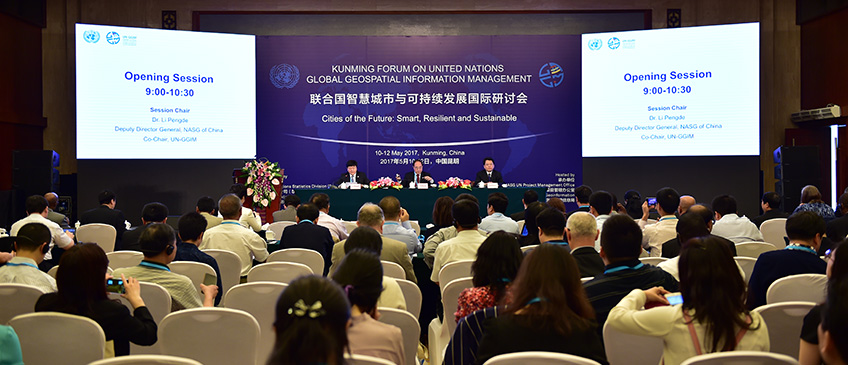The Kunming Forum informed the global geospatial information management community of the unique challenges and opportunities vis-à-vis to proactively shape and build smart, resilient and sustainable cities of the future. The demand and need for quality, reliable and timely data to inform good policy and decision making in urban contexts must not be under-estimated. Concerted and collaborative efforts are needed to bring together and integrate data and information from multiple sources and with differing scales and temporality, leveraging geospatial information management as a technological and critical enabler for all countries.
The Kunming Forum on United Nations Global Geospatial Information Management (UN-GGIM), with the theme "Cities of the Future: Smart, Resilient and Sustainable" was convened in Kunming, China, from 10-12 May 2017. More than 160 experts from 30 countries met to share experiences and methodologies on a number of contemporary topics to emphasize and explore the role and contribution of geospatial information in shaping and building smart, resilient and sustainable cities of the future. The Kunming Forum was organised by the United Nations Statistics Division, Department of Economic and Social Affairs, as the Secretariat of the UN-GGIM in collaboration with the Government of China through the National Administration of Surveying, Mapping and Geoinformation.
The Forum was opened with forward-looking statements by: Dr. Liu Huiyan, Vice Governor, Government of Yunnan Province; Mr. Wu Hongbo, Under-Secretary-General for Economic and Social Affairs, United Nations; and Mr. Kurexi Maihesuti, Vice Minister, Ministry of Land and Resources and Director-General, National Administration of Surveying, Mapping and Geoinformation of China. All invited officials agreed that the theme of the Kunming Forum was most appropriate and timely, providing all stakeholders a platform to address both challenges and opportunities to proactively shape cities of the future that will be smarter, more resilient and sustainable.
The technical thematic sessions of the Kunming Forum provided leading, innovative and encouraging ideas, and comprised topics that included: visioning the cities of the future; leveraging innovation and technology; emerging approaches and methods in data collection, mapping and modelling; integrative information systems and their growing analytical needs; geospatial information and services for disasters; cooperation and partnerships; capability and capacity development; and the geographic dimensions of the 2030 Agenda for Sustainable Development.
Contact details:
Mr. TEO CheeHai
Global Geospatial Information Management
United Nations Statistics Division
Department of Economics and Social Affairs
Email: teo@un.org
Documents
- Announcement Letter
- Concept Note
- Information Note
- Provisional Annotated Agenda
- Summary Report
- List of participants
Photographs
Materials for the Kunming Forum
- Statements
- Dr. Liu Huiyan, Vice Governor, Yunnan Province
- Mr. Wu Hongbo, Under Secretary General for Economic and Social Affairs, United Nations
- Mr. Kurexi Maihesuti, Vice Minister, Ministry of Land and Resources, Director-General, National Administration of Surveying, Mapping and Geoinformation of China
Presentation Materials
- Session 1: Visioning the Cities of the Future
- Session 2: Smart and Resilient Cities: Leveraging Innovation and Technologies
- Session 3: Smart and Resilient Cities: Leveraging Integrative Information Systems
- Mr. Chu Ishida (Japan), Space-based Earth Observation Applications for Resilient Cities
- Mr. Eduardo de la Torre (Mexico), Leverage of Geospatial and other information sources in Mexico: an institutional perspective on urban resilience
- Ms. Hui Lin, Satellite CT Scanning for Urban Infrastructural Health Diagnosis
- Ms. Sharthi Laldaparsad, South Africa, Accelerating City Transformation for Inclusion, Growth & Sustainability
- Session 4: Smart, Resilient and Sustainable Cities: Cooperation and Partnerships
- Ms. Argyro Kavvada (USA), Smart, Resilient, and Sustainable Cities: Cooperation and Partnerships
- Mr. Milan Konecny (Czech Republic), Selected Smart Cities Geospatial Challenges in the Big Data Era
- Mr. Tae Hyung Kim (UNESCAP), The 4th Industrial Revolution, City, and Sustainability
- Mr.Zhou Xiang (China), Introduction of the Asia-Oceania Global Earth Observation System of Systems (AOGEOSS)
- Session 5: Where is the data? Towards a Sustainable Data Ecosystem
- Session 6: Leveraging the Data Ecosystem
- Mr. Bernard Justus Muhwezi (Uganda), Leveraging the Data Ecosystem for Smart, Resilient and Sustainable Cities -Urbanization in Uganda
- Ms. Marie Haldorson (Sweden), Statistics of Tomorrow-Integrating Small data and Big data
- Ms. Sandra Liliana Moreno (Colombia), DANE: Progress and strides in the Integration of Statistical and Geospatial information for sustainable cities
- Prof. Wu Huayi (China), Smart City-Dynamic Data Handling for Decision Making
- Session 7: Resilient Cities - Strategic Framework on Geospatial Information and Services for Disasters
- Session 8: Improving Availability and Application of Geospatial Information
- Mr. Chen Jun (China), Role of Utilizatino of International (Global) Data
- Mr. Duane Miller (Bahamas), Improving Availability and Application of Geospatial Information The Bahamas Perspective
- Mr. Liu Rui (China), Smart Environment Protection Promotes Development of Smart City
- Mr. Stephan Arnold (Germany), Applied spatial data for sustainable development strategy in Germany
- Session 9: 2030 Agenda for Sustainable Development
- Mr. Daniel Ehrlich (European Commission), Developing a global, people-based definition of cities and settlements
- Prof. Liu Yu (China), Integrating Multi-Source Big Data to Sense Urban Dynamics
- Mr. Rolando Ocampo (Mexico), Geospatial Information and the SDGs in Mexico: institutional perspectives on urban resilience

